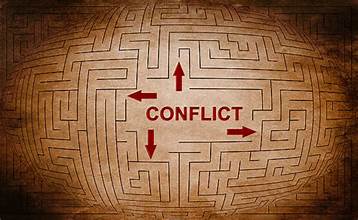
Dave and Ray Davies, the brothers who led the British band The Kinks since the 1960s, have a famously volatile relationship. Even though they managed to stay in a band together for over 40 years, they often despised each other and had explosive arguments. They addressed their relationship in the song “Hatred (A Duet)”, which featured the lines:
You wanna be my friend, well it’s too late
My love for you has turned to hate
And I think that it’s a permanent condition
You say you wanna make the peace
Smile and turn the other cheek
I can’t put myself in such a weak position
Now I’m willing to accept this fate
You and me just can’t cohabitate
We agree to hate and that’s our last decision
That’s just the first verse. The rest of the songs features many creative ways of expressing the same thoughts. But the Davies brothers don’t continually make war. When they performed their song “Hatred (a Duet)”, on The Tonight Show in the 1990s, Jay Leno asked,” You guys have always had creative tensions, wouldn’t you say? Do you guys get along?” “Sometimes,” replied Dave. “Like today, we’re getting on really well.”
The Davies aren’t the only bandmates who put together great music while loathing each other. The members of Pink Floyd disliked each other so much that they sometimes parked their tour trailers in a square with the doors facing out so that they wouldn’t accidentally encounter each other when they stepped outside. Johnny and Joey Ramone remained in the Ramones for 15 years without speaking to each other (literally) after Johnny started dating and then married Joey’s girlfriend.
While I appreciate the music of all these bands, I wish they had been more functional. Imagine what they could have done if they could have cooperated more, I think. If they could have put more energy into their music and less into their conflicts, just think of what they could have done. But then I realize that they accomplished what they did because they were willing to endure their conflicts, and to work together despite their personal feelings. They wanted to produce great music, and they were willing to pay a huge price for their accomplishments. Their tensions often created their art, rather than getting in its way.
I have to admire that level of commitment. To honestly express such strong negative feelings, and then to continue working together in spite of those feelings, takes a dedication that most people don’t possess. The musicians hated each other, but they didn’t hide it or tiptoe around it. They embraced it. And in the middle of it, they worked together to produce the best music they could.
Late in “Hatred (A Duet)”, the Davies gave a nod to their ability to work together despite their animosity:
Hate’s the only thing we have in common
There’s no escape, we’ll always be this way
So we might as well just learn to live together
‘Cos we’re gonna be this way till our dying day
With all the divisions in modern society, it’s easy to see those we disagree with as enemies. A lot of social media and radio programming is designed to feed on this dynamic. But these bands remind us that sometimes, when someone challenges us, it’s an opportunity for us to push ourselves further, rather than to dig in and defend ourselves or our work. Working with those who criticize our ideas and show us our own weaknesses is unpleasant and often downright painful, but it can also be the doorway to our greatest accomplishments.
by Marti Maltby, Director Peace House Community – A Place to Belong
This article originally appeared in “The Alley,” the newspaper for the Phillips neighborhood of Minneapolis.